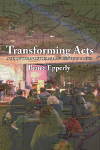Have You Ever Crossed the Street?
 No, I don’t mean this in the very literal sense, but either in the spiritual sense or in terms of affiliation. One of the defining experiences of my life involves crossing the street in this sense. I grew up as a Seventh-day Adventist. That involves quite a number of things, including keeping the Sabbath (Saturday) as a day of rest and worship, accepting certain ideas regarding the last days (eschatology), and rules for dressing, eating and drinking.
No, I don’t mean this in the very literal sense, but either in the spiritual sense or in terms of affiliation. One of the defining experiences of my life involves crossing the street in this sense. I grew up as a Seventh-day Adventist. That involves quite a number of things, including keeping the Sabbath (Saturday) as a day of rest and worship, accepting certain ideas regarding the last days (eschatology), and rules for dressing, eating and drinking.
In my case, I can easily see my life experience as multiple street-crossings. Most of my younger years were spent in the self-supporting organizations in Adventism. These formed, at the time, a sort of subculture within Adventism that was stricter in adherence to many of the teachings of the church. I moved from that to a more mainstream Adventism before I left the church entirely. I then spent time outside of any church and quite determined I would never be involved again. Finally, I found my way into a United Methodist congregation, where at first my feeling was that I had found a place of comfort. Then I got active and engaged in the work of the church again. Each of these experiences involved some aspect of “crossing the street.”
I’m getting the crossing the street metaphor from a book my company recently published, titled—you guessed it!—Crossing the Street. That book, by Dr. Bob LaRochelle, describes his personal journey of crossing the street, moving from the Roman Catholic Church to the United Church of Christ. In it, he gives two reads of the metaphor “crossing the street.” The first is a negative one, in which one crosses the street to avoid what one believes is evil. “Don’t get too near the Catholics!” the protestant might say, or vice versa. But crossing the street can, as Bob makes clear, also be a positive experience.
I have encountered the negative view of crossing the street many times in negative reactions to my own street crossing. Seventh-day Adventists find it hard to understand that I could leave their church. The more conservative of them regard me as an apostate, more to be avoided than even the ordinary non-believer. (To some SDAs, non-believers include most non-SDA Christians.) Others express understanding that I had problems with the church organization, but can’t imagine how I could have problems with the doctrines. Others assume that I’ve found a kinder, gentler organization in the United Methodist Church, and that must explain everything.
Non-SDAs who know my background often wonder why I don’t go hammer and tongs against the horrible heresies perpetrated by the Adventist church. Surely I should use my extensive knowledge of Adventism (I’m a graduate of an SDA college with an MA from the graduate school at Andrews University, earned in conjunction with the SDA Theological Seminary) to rip apart all those wrong people.
My approach is different. I value my experiences growing up as an SDA. I can reject certain elements of what I was taught without decided that the entire experience (or those I experienced it with) are horrible, without value, and not deserving of respect. In fact, I like to encourage SDAs to get into more dialog with the larger church and the larger church to get into dialog with them. There are things we can learn from the SDA experience. There are things they can learn from us.
This street crossing is very much a part of who I am. It forms a lifelong defining experience.
So when I got a proposal for a book titled Crossing the Street and discovered what it was about, I was excited. At the same time, I figured this experience would be different, because the author was moving from the Roman Catholic Church to mainline Protestantism. And, as I had learned thoroughly in growing up, there really is no organization less like the SDA Church than the Roman Catholic Church.
Wrong! Bob’s experiences in crossing the street were very similar to my own. The authority issues in the Catholic church were similar to those I found in the SDA church. What was more, Bob had moved from the Catholic church to the United Church of Christ and still saw great value in his former tradition. Instead of seeing it as a change of sides in a war, he saw his move as a new opportunity to improve dialog.
One of the things I like to emphasize to my SDA friends is that if you leave the SDA church, don’t do it because you think you’re going to find the perfect church, one without the problems in SDA churches. There are many things in the SDA church that I’ll criticize. I follow the news. I see some of the things being done currently, such as the rejection of the La Sierra University Choir by an SDA academy in Michigan, and they make me angry.
But the United Methodist Church doesn’t get everything right either. Not even close! Many of these things are based on the same human emotions as those in the SDA or the Roman Catholic churches.
I wish I had read Crossing the Street before I crossed the street. It wouldn’t have prevented the crossing, but it would have saved me time in terms of finding my balance. Yes, this book talks about a change from the Roman Catholic Church to the United Church of Christ, but it would have facilitated my own move from SDA to United Methodist just as well. In fact, I commend this to my SDA and ex-SDA friends as an example of a healthy attitude to take to such changes. I suspect that others will find similar help.

